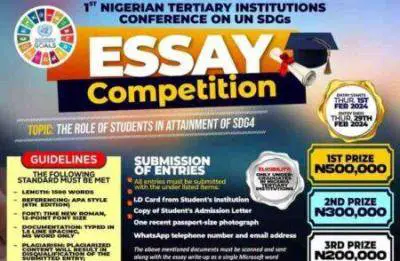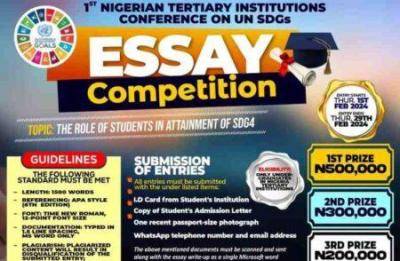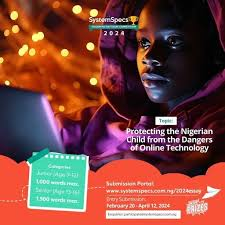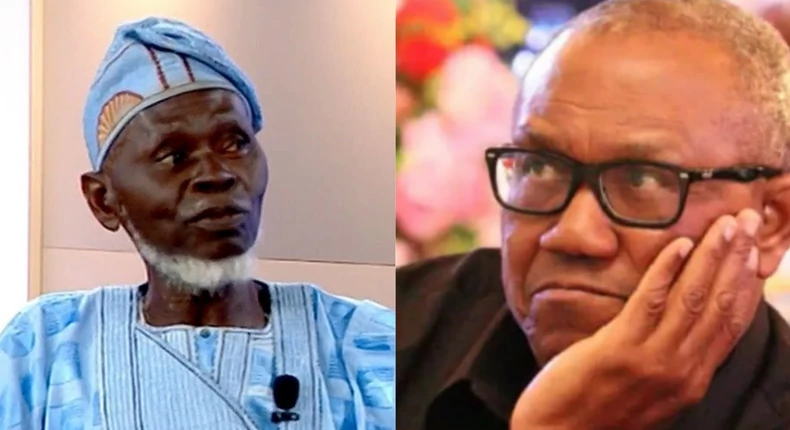Headlines
Fact-Checking the story: Polaris Bank loses N26bn loans granted to 6 ex-directors without collaterals
By Olalere Ojedokun
A report being syndicated by a section of online media with the title: Polaris Bank loses N26bn loans granted to 6 ex-directors without collaterals, made several claims in figures, interpretations and practices.
Claim 1. POLARIS Bank has lost N26.005 billion worth of loans granted to 6 ex-directors, mostly without collaterals
This claim is untrue, founded primarily on lack of understanding of accounting principles and convenient disregard of the denotative dates and notes to the accounts. The story was based on the audited accounts and report for the year ended December 31, 2022. The report was approved on March 20, 2023. In line with the general comparative and accrual reportage format, the bank presented the status report for the preceding year ended December 31, 2021 and the reporting year ended December 31, 2022. The two comparative tables were clearly marked and were also evidently seen by the writer of the story. While the 2021 insider credit status report listed eight directors with total outstanding loans of N25.827 billion, the reporting year 2022 status report updated that four directors had fully liquidated their loans, a director had partially liquidated her loan while two directors had seen increase in outstandings against their names. The 2022 status report indicated a total of N31.646 billion insider credits related to the four remaining former directors. The 2022 report clearly indicated that Abimbola Izu, Dotun Adeniyi, Tokunbo Abiru and Theodora Onwughalu had paid their loans and as such, were not listed in 2022.
The 2022 report was clearly indicative of the changes and the compliance of the bank with the Prudential Guidelines and Banks and Other Financial Institutions Act (BOFIA). A former director, with related interest in Newcross Exploration and Production, Jason Fadeyi, whose loan of N25.442 billion in 2021 accounted for 98.5 per cent of the total outstanding insider credits in 2021, saw his total outstanding loan rising to N30.922 billion in 2022, ostensibly due to accrued interests and increase due to foreign exchange (forex) conversion rate as the loan is a foreign currency (US Dollar)-denominated loan. It’s a simple understanding that forex rate is a mediating factor in foreign currency denominated loan. The closing forex rates were generally available on the Central Bank of Nigeria (CBN)’s website. The Naira/US Dollar rate was N424.11 per US$ for the year ended December 31, 2021 and N461.1 per US$ for 2022. It was N400.33 per US$ in 2020. All these partially accounted for the year-on-year change in the loan. Meanwhile, Newcross Exploration/Fadeyi’s N30.922 billion accounted for 97.7 per cent of total outstanding insider credits in 2022.
Interestingly, as rightly reported by the story, this loan, N30.922 billion, has a perfected collateral, a debenture of the assets of the company. A further check indicated that Newcross Exploration/Fadeyi’s loan is a syndicated facility by eight banks with the FBN Trustees as the trustee managing the collateral on behalf of all the lenders. Jason Fadeyi was cited for the loan under the general principles of insiders which regard family members, relatives and associates as insiders. As rightly pointed out by the story, Corporate Affairs Commission (CAC)’s records showed that Newcross Exploration and Production was registered on July 9, 2013, with Festus Fadeyi and Bolaji Ogundare as persons with significant control of the company.
The second major insider credit in 2022 report was a N535 million loan credited to Mr. Tunde Ayeni, about 1.7 per cent of the total loans. This was classified as “performing”. Altogether, the collaterised, syndicated loan of Newcross Exploration/Fadeyi and “performing” loan of Ayeni accounted for about 99.4 per cent of total outstanding insider credits in 2022. All these were clearly stated and evident in the table which the reporter accessed, but failed due to poor interpretations and understanding of reportage format.
Claim 2: As of December 31, 2022, total outstanding loans owed by these ex-directors of Polaris Bank, some of which would not be repaid, amounted to N57.473 billion.
This claim is untrue, and flowing from the first claim, it exposed the poor understanding of the comparative reporting (going-concern) basis. To arrive at its claim of N57.473 billion, the reporter simply added the total outstanding insider credits in 2021 of N25.442 billion to total outstanding insider credits in 2022 of N31.646 billion. The reporter conveniently ignored the differential in year ending and the fact that the two tables, like other segments of the annual reports and accounts, were provided for comparative reporting. The reporter ignored the indicative narration showing that the Newcross Exploration/Fadeyi’s loan was same loan, moving from a reporting year to another reporting year. By implication, the story increased Newcross Exploration/Fadeyi’s loan to N56.364 billion, 98.1 per cent of its claimed total outstanding loans of N57.473 billion.
Further check of post-year end events, which are usually indicated in updates to accounts after year-end but prior to board’s final approval and signing off of the accounts, indicated that Demanta/Ibiye Ekong’s N89 million outstanding loan was fully paid off in February 2023. In essence, the only director-related insider loan outstanding is former Managing Director Timothy Oguntayo’s N100 million, which is a subject of reconciliation between the tripartite of employee, employer and regulator. As noted by the story, Oguntayo “who was earlier charged by the Economic and Financial Crimes Commission (EFCC) but later exonerated”, had no misconduct established against him. As noted earlier, the Newcross Exploration/Fadeyi’s loan is a syndicated facility by eight banks with the FBN Trustees as the trustee managing the collateral on behalf of all the lenders. CBN’s Prudential Guidelines states that “For syndicated facilities, the classification shall be the same across all banks involved in the syndication. Thus, the worst classification by any of the banks involved in the syndication shall apply across board”.
Claim 3: Abimbola Izu, another ex-director, got N103 million mortgage loan from Polaris Bank but did not repay it, according to bank records. Her collateral perfection status was also recorded as “not applicable.” Bank records also showed that Izu took a term loan of N17 million with another “not applicable” collateral status.
This claim is untrue. The 2022 audited report, on which the story was based, showed that Izu was not indebted to the bank, having liquidated the prior year’s status report.
Claim 4: Fadeyi borrowed another N30.922 billion term loan from the bank – which has been placed on the watchlist.
This claim is false. It emanated from the poor understanding of the comparative reporting (accrual, going concern), basis. This claim particularly undercut the credibility of the entire story, obviously showing the reporter had no training or understanding of financial reporting/journalism. This also subjects the story to motive analysis as the reporter failed to adhere to a pattern of errors, rather zigzagging across erroneous claims to arrive at unsubstantiated claims. For instance, while doubling up Fadeyi’s, the story kept Oguntayo’s N100 million loan unchanged over the comparative years, but curiously reported Ekong’s loan as N89 million (2022 year-end outstanding) and N4 million, N4 million (two loans in 2021). Whereas, the 2021 report showed that Ekong owed a total of N108 million (N100 million by Demanta, N4 million, N4million), and by 2022, these reduced to N89 million, having liquidated the two N4 million, N4 million personal loans and reducing the N100 million related loan to Demanta to N89 million. A pattern of error would have simply added Ekong’s related loans of N108 million in 2021 with N89 million in 2022 to arrive at a false premise like Fadeyi’s. The story, cherry-picking of figures, simply reported N89 million while adding the two personal loans of N4 million each for Ekong as latest reporting year status.
Claim 5: Based on Polaris Bank’s records, Ibiyi Ekong of Demanta Nigeria Limited is another ex-director who took loans from the bank without repaying them. Ekong, a former executive director of the bank who resigned in 2016, owes the bank N89 million. Ekong also owes the bank N4 million borrowed as a mortgage loan and another N4 million taken as an auto loan, which was not repaid.
This claim is untrue. As explained above, the reporter engaged in convenient cherry-picking of figures, due to poor financial journalism background and lack of fidelity, even in its erroneous claims. While its claims based on the reporting year ended December 31, 2022 were false, post-reporting events showed that Demanta, which was the only Ekong-related insider credit outstanding in 2022, had been paid by February 2023, prior to the signing and final approval of the account in March 2023. The story: Polaris Bank loses N26bn loans granted to 6 ex-directors without collaterals, was first reported by one EconomyPost in October 27, 2023 and was reposted by one International Centre for Investigative Reporting (ICIR) Nigeria on October 31, 2023. There were clearly other reporting periods that the writer could have sought updates on the post-year-end changes.
Claim 6: Theodora Amaka Onwughalu is another ex-director who borrowed N19 million mortgage loan from Polaris Bank but did not pay it back.
This claim is false. The 2022 reporting year status indicated Onwughalu was not indebted to the bank. Her total indebtedness of N19 million in 2021 had been paid by 2022.
Claim 7: Similarly, Dotun Adeniyi, an ex-director of Polaris Bank, borrowed N27 million mortgage loan from the financial institution but did not repay it.
This claim is false. The 2022 reporting year status indicated Adeniyi was not indebted to the bank. His total indebtedness of N27 million in 2021 had been paid by 2022.
Claim 8: Tokunbo Abiru, now a Lagos senator, was appointed the managing director of the then Skye Bank in 2016 but resigned in 2020 to fulfil his political ambition.
In its cherry-picking and convenient disregard for facts and figures, the story while narrating the Abiru’s relationship, ignored that the 2021 report indicated that Abiru, as an ex-director, had a related (taken by a company related under insiders’ principles) “performing” loan of N9 million in 2021 reporting year, which had been paid off by the 2022 reporting year.
Claim 9: Collateralisation of loans
The story sensationally placed “without collaterals” and ran under this theme alongside its cherry-picking of figures to portray an image of unusual, untoward or underhand transactions. Beside ignoring the fact that 98.5 per cent of the total outstanding insider-related credits in 2021 and 97.7 per cent of 2022’s report had a perfected collateral, and also 1.7 per cent of the 2022’s credit status was “performing”- altogether collateralized/performing status of 99.4 per cent in 2022; the story conveniently ignored the global banking practice, and as applicable in Nigeria as well, that secured and unsecured loans are typical in banks’ loan books. The credit risk assessment and banking rules allow banks to beyond collaterals, approve and grant loans to some extent (depending on each internal guidelines), based on subjective assessments. This is a generally available information and one of the basics in financial journalism classes. Loans, in terms of security, are generally divided into two- secured loans (with collaterals) and unsecured loans (without collaterals). The secured loans are so called because of the presence of a collateral, a physical asset that backed up the loan, which the lender has the right to take in the case of default. Unsecured loan is so called because of absence of physical asset, but in the reality of credit risk assessment and recovery, it’s secured by personal goodwill and standing, a case-by-case subjective assessment of a customer’s credit worthiness and the size of the loan. In any case, the lender has the option of recourse to court to enforce recovery of “unsecured loan”, in the event of a default.
In a February 24, 2022 report titled “Here are banks that offer loans without collateral”, Business Day (businessday.ng), a leading business and economy daily, reported increased demand for “unsecured lending” among Nigerian Deposit Money Banks (DMBs). The newspaper reported that “as seen in the latest data from the Central Bank of Nigeria (CBN), demand for unsecured lending has been on the rise but lower than the demand in the pre-COVID-19 years”. The story listed not less than eight banks that were offering “loans without collateral” to the general public, including Nigeria’s four largest banks. In recognition of its status as acceptable banking/lending practice, the BOFIA included provisions guiding unsecured lending.
Claim 10: Insiders
The story ran a villainous theme of undue characterization of insiders’ transactions in banks, either out of poor understanding or its convenient disregard of practice or both. Both BOFIA and CBN’s Prudential Guidelines make provisions for insider-related transactions, premised on the understanding that excluding significant stakeholders in a company’s business may be tantamount to undermining same company. Prudential Guidelines define insiders to include “directors, significant shareholders, employees and investee companies (such as associates, subsidiaries, joint ventures) of banks, and other entities in which they have significant control”. In line with the BOFIA, the term “director” includes director’s wife, husband, father, mother, brother, sister, son, daughter and their spouses. A significant shareholder is regarded as someone holding at least 5.0 per cent ((individually or in aggregate) of a bank’s equity. The CBN requires that “Director, insider and significant shareholder credit exposure shall be fully disclosed by banks in their financial statements and returns prescribed by the Central Bank of Nigeria”. It also required banks to “ensure that their credit policies specifically address lending to directors as part of related parties or insiders lending policies”. In treating insiders’ loans, BOFIA states that a bank shall not lend “more than five per cent of its paid-up capital to any of its directors or significant shareholders provided that the aggregate of the bank’s exposure to all its directors and significant shareholders does not exceed 10 per cent of its paid up share capital or such percentage as the Bank (CBN) may prescribe”. Polaris Bank neither violates any principles in lending to directors nor the limits prescribed by the laws.
Claim 11: Classification of loans
The story sensationally ran the denotative classification of the loans as “lost”, implying that such classification meant that “it was not recovered by the bank” or not going to be paid back. In fact, its headline of “lost”, was casted on this wrong premise of understanding of classification of loans and the recoverable status. Classification of loans are guided by stipulated timelines by the CBN Prudential Guidelines and the terms associated with this classification are credit risk management references, not absolute ordinary meanings.
The CBN Prudential Guidelines state that a credit facility should be deemed as non-performing when interest or principal is due and unpaid for 90 days or more. The guidelines indicate that a loan can be substandard, doubtful or lost. A loan is subs-standard when unpaid principal or interest remain outstanding for more than 90 days but less than 180 days.
A loan is classified as doubtful when unpaid principal or interest remain outstanding for at least 180 days but less than 360 days. A loan is classified as lost when unpaid principal and or interest remain outstanding for 360 days or more. The CBN Prudential Guidelines state that for a facility granted to an “insider or related party credit”, which had been fully provided for, to be written off, “the approval of CBN is required”. This provision is higher than requirement for writing off provisioned lost loans by non-insider.
Motive analysis and convenient infidelity to facts
A general review of the story subjects the reporter to “motive analysis”, especially with its convenient infidelity to facts and figures and many “patterns of errors”. Was the report a targeted blackmail working to achieve a predetermined notion of characterization, rather than a professional analysis of financial report? Was the story in pattern of poor-taste, grant-chasing reports by a section of media seeking to demonise entities to secure funding? It was clear the reporter carefully “shuffled” facts and provided no basis for far-reaching assumptions and claims. While the reporter was copiously referring to unrelated businesses and current positions of the former directors, it failed to make similar efforts to reach out to the affected directors in the spirit of fair reporting.
Ethics
The report failed the ethical test, especially in the light of the “statement of principles” of both Economy Post and ICIR. Economy Post, set up in 2023, aims to promote responsible journalism that is fair, just and free from external corporate and political influences. The ICIR seeks to be an independent, non-profit news agency that promotes transparency and accountability through robust and objective investigative reporting. ICIR, particularly, failed to fact-check the report and its wholesale adoption of the story belied the enviable reputation of its board of trustees. Fairness, fact-checking and corrections are cardinal operating principles of ICIR reportage. ICIR commits: “We will take utmost care to be fair to all subjects in news stories. All sides of a story must have their say. Fairness is a cardinal requirement in Journalism, more so investigative reporting. If anybody is involved in anything that appears negative or unseemly, an extra effort must be made to get his own side of the story. If any such person declines comment, it should be so stated.
“Also, facts must be accurately presented. Facts are sacred. In dealing with sources, document, databases and the Internet, it is not enough to quote the information gotten correctly, an effort must be made to establish its accuracy. Where possible, cross check your facts again and again using different sources.
“The ICIR is committed to the principle of fairness and accuracy. Therefore, when we make a mistake, we will promptly correct it. If the correction is significant, we will explain the change and the reason for it. In addition, if there is an update to the story, we will provide clarification. And if the entire report is open to question or fails to meet our ethical standard, we will provide clarification signed by the editor”. With all these, it will be fair to expect ICIR to correct its mistake in reposting the misleading story, given numerous factual, operational and textual errors cited above. The story is below par and unseemly to the avowed ideals of ICIR.
In conclusion, the story “Polaris Bank loses N26bn loans granted to 6 ex-directors without collaterals” is erroneous and misleading, the bank has lost no money to ex-directors’ loans, as inappropriately claimed by the publication.
Ojedokun is a Lagos-based Independent Journalist/Analyst
The post Fact-Checking the story: Polaris Bank loses N26bn loans granted to 6 ex-directors without collaterals appeared first on Jomog.
Education
1ST NIGERIAN TERTIARY INSTITUTIONS CONFERENCE ON UN SUSTAINABLE DEVELOPMENT GOALS (SDGS) ESSAY COMPETITION

Competition Overview:

The SDG Youth Essay Competition offers a grand prize of N1 million for the top three winners, along with free sponsorship to attend the 1st Nigeria Tertiary Institution Conference on Sustainable Development Goals (SDGs) in April 2024 in Abuja.
Competition Requirements:
1. Eligibility:
– Open exclusively to undergraduates in Nigerian tertiary institutions.
2. Entry Guidelines:
– Topic:The Role of Students in Attainment of SDG4
– length: Essays should be 1500 words.
– Entry Period: Thursday, February 1, 2024 – Thursday, February 29, 2024
– Referencing: APA Style (6th Edition).
– Font: Times New Roman, 12-point font size.
– Documentation: Typed in 1.5 line spacing, MS Word format only.
– Plagiarism: Only original content is accepted; plagiarized entries will be disqualified.
Benefits:
– Prizes:
– 1st Prize: N500,000
– 2nd Prize: N300,000
– 3rd Prize: N200,000
– Winners will also receive free sponsorship to attend the 1st Nigeria Tertiary Institution Conference on Sustainable Development Goals (SDGs) in April 2024 in Abuja.
Required Documents:
– Student’s Institution ID Card
– Copy of Student’s Admission Letter
– One recent passport-size photograph
– WhatsApp telephone number and email address
Application Procedure:
– All entries and submissions (essay and required documents) should be scanned and sent to nigeriaessay@sdgyouth.org before the deadline.
For Further Inquiries:
– Call: 08068931151, 08133846739, 07067772964
– Email: nigeriaessay@sdgyouth.org
Deadline: February 29th, 2024
Don’t miss this opportunity to contribute to achieving SDG4 and win exciting prizes. Submit your entry and required documents before the deadline. For any inquiries, feel free to contact them via phone or email.
Education
PENTAGON PARTNERS NATIONAL ESSAY COMPETITION FOR UNDERGRADUATE LAW STUDENTS

Competition Overview:

The National Essay Competition invites undergraduate law students to showcase their expertise and contribute to the discourse on AI, privacy, and data protection. In addition to cash prizes, participants have the chance to intern with Pentagon Partners, gaining valuable hands-on experience.
Competition Requirements:
1. Eligibility:
– The competition is open to 400-level and 500-level undergraduate law students in Nigerian universities.
2. Essay Requirements:
– Length: Essays should not exceed 1500 words.
– Format: Double spaced, 12pt Times New Roman font.
– References: OSCOLA format for citations with 10pt font size for footnotes and endnotes.
– Submission Format: Essays must be submitted in PDF format.
– Entrant Details: Include full names, school, level, phone number, and email address in both the body of the email and on the last page of the essay.
– Single Entry: Each entrant is allowed only one submission.
– Originality: Plagiarism will result in automatic disqualification.
Competition Benefits and Timeline:
1. Prizes:
– Winner: N200,000
– 1st Runner Up: N150,000
– 2nd Runner Up: N100,000
2. Internship Opportunity:
– In addition to cash prizes, winners have the exclusive opportunity to intern with Pentagon Partners, enhancing their career prospects.
Application Procedure:
– Interested participants should submit their essays to essay@pentagonpartnerslp.com during the submission period.
– The subject of the email should be the Essay topic
For additional information and updates, visit www.pentagonpartnerslp.com.
Deadline: March 22nd, 2024
Don’t miss this chance to showcase your legal expertise, contribute to important discussions on AI and law, and vie for enticing cash prizes. Pentagon Partners looks forward to receiving your submissions.
Education
SYSTEMSPECS CHILDREN’S DAY ESSAY COMPETITION (CDEC), 2024

Purpose:
Inaugurated in 2020, the CDEC is part of SystemSpecs’ Corporate Social Responsibility (CSR) commitment to promoting capacity development in the Nigerian ICT industry. By encouraging young Nigerians to tackle everyday issues, the competition contributes to intellectual growth and societal progress.

Topic:
The theme for the 2024 competition is “Protecting the Nigerian Child from the Dangers of Online Technology.” Participants are tasked with exploring strategies to safeguard children in an increasingly digital world.
Eligibility:
– Open to primary and secondary school students in Nigeria aged 9 to 16.
– Junior category (ages 9 to 12) essays must not exceed 1,000 words.
– Senior category (ages 13 to 16) essays must not exceed 1,500 words.
Prizes:
– Winners will receive generous rewards, including a high-capacity laptop, premium headphones, a portable laptop stand, a smart wristwatch, and one year of internet data, among other items.
– Consolation prizes will be awarded to other participants.
Application Process:
– Interested candidates should access the application page
– Essays must be written in English and reflect original thought.
– Each participant is limited to one entry.
– Entries must be endorsed by an accredited school official, parent, or legal guardian.
– Deadline for submissions is April 12, 2024.
Submission Guidelines:
– All submissions must be in PDF format and include the student’s name, home and school addresses, email address, and contact phone number.
– Double entries will result in automatic disqualification.
– Submissions must be received by March 15, 2024, at 5:00 p.m.
Notification of Winners:
– Successful students and schools will be contacted in the second quarter of the year.
– Updates on winners will be announced on @nercng social media platforms.
The SystemSpecs Children’s Day Essay Competition offers a unique opportunity for Nigerian students to demonstrate their creativity and problem-solving skills. By addressing the theme of online child protection, participants contribute to building a safer and more secure digital environment for all. We encourage eligible students to seize this opportunity and showcase their talent and ingenuity.
-

 News12 months ago
News12 months agoFull Text of President Bola Tinubu’s Inauguration Speech on May 29, 2023
-
Headlines8 months ago
FULL TEXT: Tinubu Addresses 78th UN General Assembly
-
Headlines10 months ago
Full Text Of President Bola Tinubu’s Address To Nigerians On Socio-economic Challenges
-

 entertainment3 months ago
entertainment3 months agoAuthorities Arrest Six in Connection with Murder of South African Rapper AKA [VIDEO]
-
Headlines12 months ago
Nigerians Berate Tinubu’s Subsidy Removal, Says Dangote Won’t Subsidise Petrol For Nigeria
-

 Headlines3 months ago
Headlines3 months agoTinubu Takes Full Responsibility for Current Economic Hardship
-

 CELEBRITY NEWS11 months ago
CELEBRITY NEWS11 months agoHilda Baci: 6 Benefits the Nigerian Chef May Enjoy as Guinness World Record Holder
-

 Headlines12 months ago
Headlines12 months agoApapa labels Peter Obi a liar after court scuffle with LP supporters

